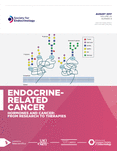Social isolation induces autophagy in the mouse mammary gland: link to increased mammary cancer risk
- Allison Sumis1,*,
- Katherine L Cook1,2,*,
- Fabia O Andrade1,3,
- Rong Hu1,
- Emma Kidney1,
- Xiyuan Zhang1,
- Dominic Kim1,
- Elissa Carney1,
- Nguyen Nguyen1,
- Wei Yu1,
- Kerrie B Bouker1,
- Idalia Cruz1,
- Robert Clarke1 and
- Leena Hilakivi-Clarke1⇑
- 1Department of Oncology, Georgetown University, Washington, District of Columbia, USA
- 2Department of Surgery, Wake Forest University, Winston-Salem, North Carolina, USA
- 3Faculty of Pharmaceutical Sciences, Department of Food and Experimental Nutrition, University of São Paulo, São Paulo, Brazil
- Correspondence should be addressed to L Hilakivi-Clarke; Email: clarkel{at}georgetown.edu
Abstract
Social isolation is a strong predictor of early all-cause mortality and consistently increases breast cancer risk in both women and animal models. Because social isolation increases body weight, we compared its effects to those caused by a consumption of obesity-inducing diet (OID) in C57BL/6 mice. Social isolation and OID impaired insulin and glucose sensitivity. In socially isolated, OID-fed mice (I-OID), insulin resistance was linked to reduced Pparg expression and increased neuropeptide Y levels, but in group-housed OID fed mice (G-OID), it was linked to increased leptin and reduced adiponectin levels, indicating that the pathways leading to insulin resistance are different. Carcinogen-induced mammary tumorigenesis was significantly higher in I-OID mice than in the other groups, but cancer risk was also increased in socially isolated, control diet-fed mice (I-C) and G-OID mice compared with that in controls. Unfolded protein response (UPR) signaling (GRP78; IRE1) was upregulated in the mammary glands of OID-fed mice, but not in control diet-fed, socially isolated I-C mice. In contrast, expression of BECLIN1, ATG7 and LC3II were increased, and p62 was downregulated by social isolation, indicating increased autophagy. In the mammary glands of socially isolated mice, but not in G-OID mice, mRNA expressions of p53 and the p53-regulated autophagy inducer Dram1 were upregulated, and nuclear p53 staining was strong. Our findings further indicated that autophagy and tumorigenesis were not increased in Atg7+/− mice kept in social isolation and fed OID. Thus, social isolation may increase breast cancer risk by inducing autophagy, independent of changes in body weight.
- Received 18 August 2016
- Accepted 19 August 2016
- Made available online as an Accepted Preprint 22 August 2016
- © 2016 Society for Endocrinology












